
Summary
- The unused concept art for Star Wars reveals alternate versions of the movies that almost came to pass, showcasing George Lucas's evolving vision for the series.
- The sequels and anthology films also had many unused concepts, providing a glimpse into the wildly different directions that could have been taken.
- The concept art offers inspiration for future stories and shows how different character designs and plot choices could have radically altered the Star Wars movies.
Star Wars concept artists have created some of the most gorgeous artwork in science fiction, but many designs go unused, revealing alternate versions of the movies that almost came to pass. George Lucas's early vision of what was then called The Star Wars was different from what the story became, and the developing concept art reflects how his ideas changed as he developed the first movie. The later films may not have been starting from scratch in the same way as the first, but there were still many unused concepts as Lucas wrote the various sequels.
This trend continued after Lucas sold the franchise to Disney, especially when Lucasfilm had to develop a new Star Wars trilogy without the creator. The sequels and the anthology films almost went in wildly different directions, and thankfully, much of the unused concepts are available through artwork. 15 pieces offer the most fascinating glimpse into an alternate version of the Star Wars movies while providing plenty of inspiration for future stories.
Your browser does not support the video tag. 15 Stormtroopers With Lightsabers (A New Hope) 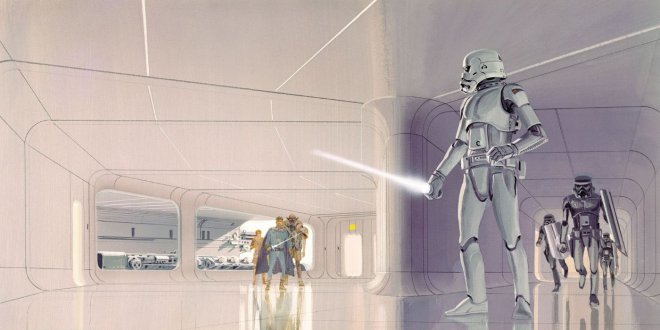 One of Ralph McQuarie's original concept designs for the original Star Wars movie was stormtroopers also carrying lightsabers. Lucas initially envisioned lightsabers as a standard weapon but changed them to Jedi-exclusive to make the laser swords more magical. Although antagonists like the Praetorian Guards, General Grievous' Magna Guards, and even Fist Order stormtroopers eventually had weapons that could counter a lightsaber, it's interesting to consider how the Star Wars saga would be different if anyone could wield a lightsaber.
One of Ralph McQuarie's original concept designs for the original Star Wars movie was stormtroopers also carrying lightsabers. Lucas initially envisioned lightsabers as a standard weapon but changed them to Jedi-exclusive to make the laser swords more magical. Although antagonists like the Praetorian Guards, General Grievous' Magna Guards, and even Fist Order stormtroopers eventually had weapons that could counter a lightsaber, it's interesting to consider how the Star Wars saga would be different if anyone could wield a lightsaber.
14 Boba Fett In White Armor (The Empire Strikes Back) 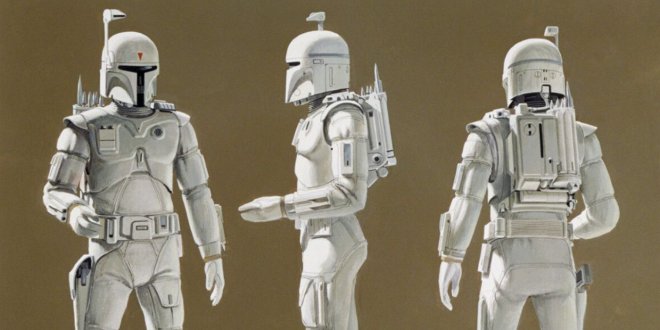 Boba Fett's design is one of the coolest in Star Wars, but McGquarie's first concept for the bounty hunter was just as visually striking. The armor was white like the stormtroopers, which later inspired the Mandalorian Imperial Super Commandos in Star Wars Rebels season 3. This approach to Boba's design could have radically altered his character and development in later movies and TV shows.
Boba Fett's design is one of the coolest in Star Wars, but McGquarie's first concept for the bounty hunter was just as visually striking. The armor was white like the stormtroopers, which later inspired the Mandalorian Imperial Super Commandos in Star Wars Rebels season 3. This approach to Boba's design could have radically altered his character and development in later movies and TV shows.
13 The Emperor's Volcano Throne Room (Return Of The Jedi) 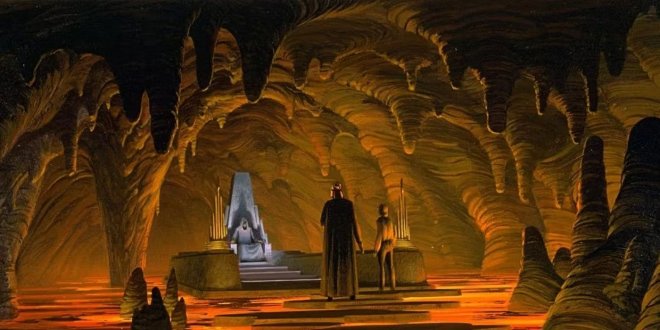 Perhaps the most hauntingly beautiful of McQuarie's concept art was the Emperor's throne room in a volcano in Return of the Jedi. It would have symbolized Luke Skywalker stepping into hell to face the devil and save his father's soul, and there would have been immediate danger at all times. While this version never came to pass, its design likely inspired Supreme Leader Snoke's throne room in Star Wars: The Last Jedi and Palpatine's Sith throne in Star Wars: The Rise of Skywalker. Lucas also kept the idea of the hero fighting in a volcano when he returned to write Star Wars: Episode III – Revenge of the Sith.
Perhaps the most hauntingly beautiful of McQuarie's concept art was the Emperor's throne room in a volcano in Return of the Jedi. It would have symbolized Luke Skywalker stepping into hell to face the devil and save his father's soul, and there would have been immediate danger at all times. While this version never came to pass, its design likely inspired Supreme Leader Snoke's throne room in Star Wars: The Last Jedi and Palpatine's Sith throne in Star Wars: The Rise of Skywalker. Lucas also kept the idea of the hero fighting in a volcano when he returned to write Star Wars: Episode III – Revenge of the Sith.
12 Obi-Wan Kenobi VS. Droidekas (The Phantom Menace) 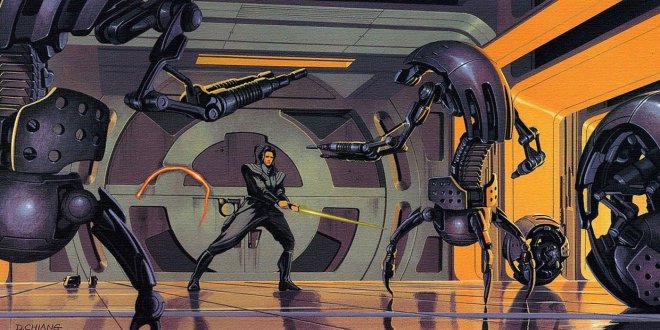 If Ralph McQuarie's art shaped the original trilogy, then Doug Chiang did the same for the prequels, creating one of the most fascinating concept designs for Star Wars: Episode I – The Phantom Menace. It features a different design for Obi-Wan Kenobi, with the young Padawan sporting black hair with a long ponytail, black robes, and a green lightsaber. This version shows Obi-Wan surrounded by Droidekas, which would likely stop him from using the Force Run to escape as he did in the final movie. Qui-Gon appears to be cutting through the door to help his apprentice, which could have paralleled Obi-Wan's inability to help his master at the movie's climax.
If Ralph McQuarie's art shaped the original trilogy, then Doug Chiang did the same for the prequels, creating one of the most fascinating concept designs for Star Wars: Episode I – The Phantom Menace. It features a different design for Obi-Wan Kenobi, with the young Padawan sporting black hair with a long ponytail, black robes, and a green lightsaber. This version shows Obi-Wan surrounded by Droidekas, which would likely stop him from using the Force Run to escape as he did in the final movie. Qui-Gon appears to be cutting through the door to help his apprentice, which could have paralleled Obi-Wan's inability to help his master at the movie's climax.
11 Obi-Wan and Anakin VS. Dooku (Attack of the Clones) 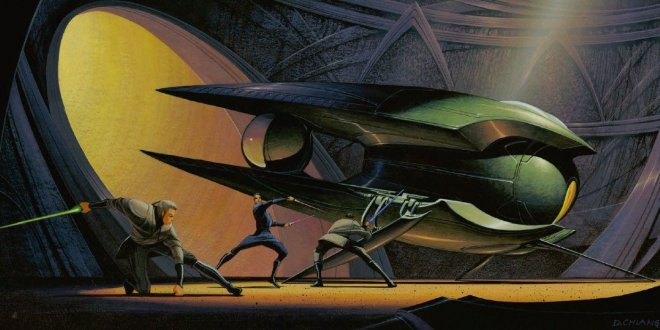 Obi-Wan and Anakin Skywalker couldn't fight Count Dooku together in Star Wars: Episode II – Attack of the Clones, but another piece by Chiang offers a glimpse at what may have been. This version clearly shows Obi-Wan and Anakin working together to fight Dooku, with Anakin going in "slowly on the left" after all. Interestingly, this Dooku wields two red lightsabers, which carried over to his apprentice, Asajj Ventress. This Dooku also seems more agile than the final version, ditching his cape and preparing to fight both Jedi simultaneously.
Obi-Wan and Anakin Skywalker couldn't fight Count Dooku together in Star Wars: Episode II – Attack of the Clones, but another piece by Chiang offers a glimpse at what may have been. This version clearly shows Obi-Wan and Anakin working together to fight Dooku, with Anakin going in "slowly on the left" after all. Interestingly, this Dooku wields two red lightsabers, which carried over to his apprentice, Asajj Ventress. This Dooku also seems more agile than the final version, ditching his cape and preparing to fight both Jedi simultaneously.
10 Padmé Tries To Kill Anakin (Revenge Of The Sith) 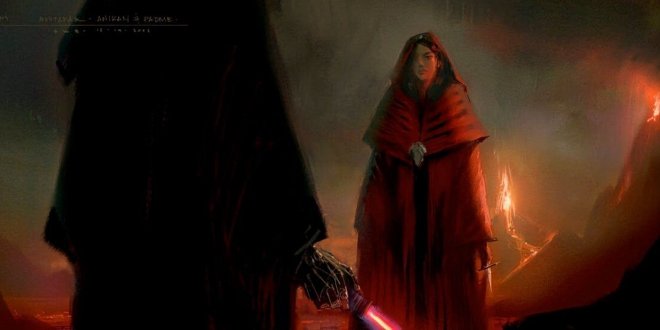 The most surprising of the prequel trilogy's concept art that surfaced after several years was a much darker ending for Anakin and Padmé Amidala. The image shows Padmé with a knife in her hand, preparing to kill Anakin, who shockingly has a red lightsaber. Concept artist Ian McCaig expanded on this by explaining that although she came there to stop Darth Vader, she ultimately loved him too much to go through with it. Padmé's sudden willingness to kill Anakin probably wouldn't have made sense, and it may have conflicted with Luke's desire to redeem his father. Even so, it's fascinating that Lucas' team considered the idea.
The most surprising of the prequel trilogy's concept art that surfaced after several years was a much darker ending for Anakin and Padmé Amidala. The image shows Padmé with a knife in her hand, preparing to kill Anakin, who shockingly has a red lightsaber. Concept artist Ian McCaig expanded on this by explaining that although she came there to stop Darth Vader, she ultimately loved him too much to go through with it. Padmé's sudden willingness to kill Anakin probably wouldn't have made sense, and it may have conflicted with Luke's desire to redeem his father. Even so, it's fascinating that Lucas' team considered the idea.
9 "Fire And Ice" Lightsaber (The Force Awakens) 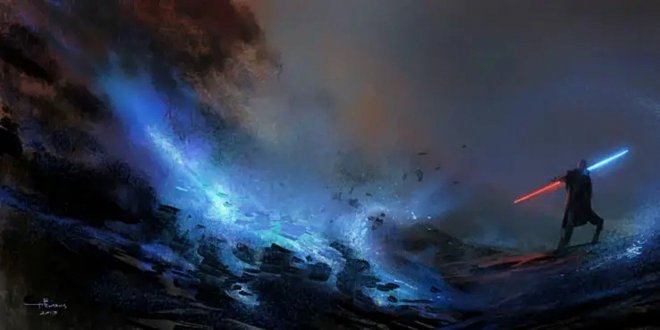 One of the coolest unused lightsaber concepts in the sequel trilogy was a "Fire and Ice" lightsaber designed for Star Wars: The Force Awakens. This was meant to visually represent the balance between the dark and light sides of the Force, and it could have set up an intriguing theme from the start of the trilogy. It would have signified that Star Wars was going in a different direction and adding something incredible to the franchise.
One of the coolest unused lightsaber concepts in the sequel trilogy was a "Fire and Ice" lightsaber designed for Star Wars: The Force Awakens. This was meant to visually represent the balance between the dark and light sides of the Force, and it could have set up an intriguing theme from the start of the trilogy. It would have signified that Star Wars was going in a different direction and adding something incredible to the franchise.
8 Darth Talon Jumps From Page To Screen (The Force Awakens)  Lucas originally intended to have the female Sith Lord Darth Talon as the new Vader of the sequel trilogy, and while this didn't end up happening, she did receive a stunning piece of concept art for what became The Force Awakens. Talon first appeared in the Legends comic series Star Wars: Legacy by John Ostrander and Jan Duursema, and while the story was set over a hundred years after Return of the Jedi, Lucas liked the character enough to adapt her for his version of the sequels. The art captures her design perfectly and showcases what Lucas' sequels may have looked like.
Lucas originally intended to have the female Sith Lord Darth Talon as the new Vader of the sequel trilogy, and while this didn't end up happening, she did receive a stunning piece of concept art for what became The Force Awakens. Talon first appeared in the Legends comic series Star Wars: Legacy by John Ostrander and Jan Duursema, and while the story was set over a hundred years after Return of the Jedi, Lucas liked the character enough to adapt her for his version of the sequels. The art captures her design perfectly and showcases what Lucas' sequels may have looked like.





